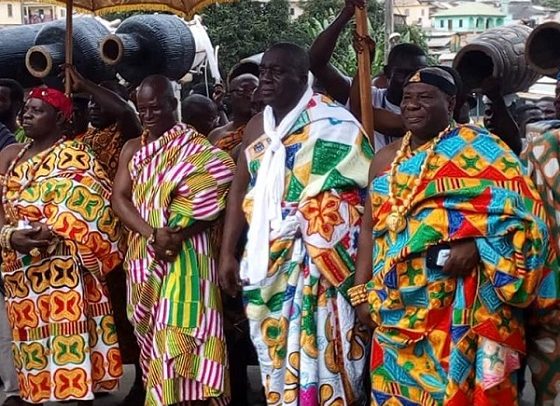Nana Kobina Nketsia V (2nd right) arrives at the festival grounds
The Minister of Railways Development, Joe Ghartey, has revealed that his ministry has finished rehabilitating the Railway Training School located at Essikado in the Western Region.
The Akufo-Addo government has worked tirelessly to transform the defunct Railway Training School into a world-class technical training institute as part of efforts to revamp the railway sector.
The training school was revived in collaboration with the University of Mines and Technology (UMaT) at Tarkwa.
The hitherto active training institute currently has enough facilities for the running of tertiary courses to train technical personnel for industry, academia and entrepreneurship.
Speaking at this year’s celebration of Kundum Festival of the chiefs and people of Essikado, Joe Ghartey, who is also the Member of Parliament for the area, disclosed that the school is ready to admit students. He stated that UMaT would soon complete its ‘intellectual’ work for the institute to take off.
He said railways development in the country started at Essikado-Ketan and was excited that the once active training school had been revived eventually.
Nana Kobina Nketia V, Paramount Chief of Essikado Traditional Area, bemoaned the much chieftaincy litigation in the region which remains unresolved.
He regretted that in recent times, these disputes had degenerated into bloody conflicts and chaos. He condemned the recent attack on the Paramount Chief of Lower Dixcove Traditional Area, Nana Kwasi Agyemang IX.
The Regional Minister, Kwabena Okyere Darko-Mensah, said the time and resources
wasted on litigation could easily be channelled into more productive ventures
for the benefit of majority of the people.
He advised the chiefs and other opinion leaders in the traditional area to initiate support for developmental projects that would improve the socio-economic fortunes of the people.
Kundum is an annual festival celebrated by the Ahanta ethnic group. It commences in Sekondi in the Western Region every August and ends in Cote d’Ivoire in December.
They use the period for reconciliation, by settling family and community disputes, including the initiation of developmental projects.
From Emmanuel Opoku, Essikado


